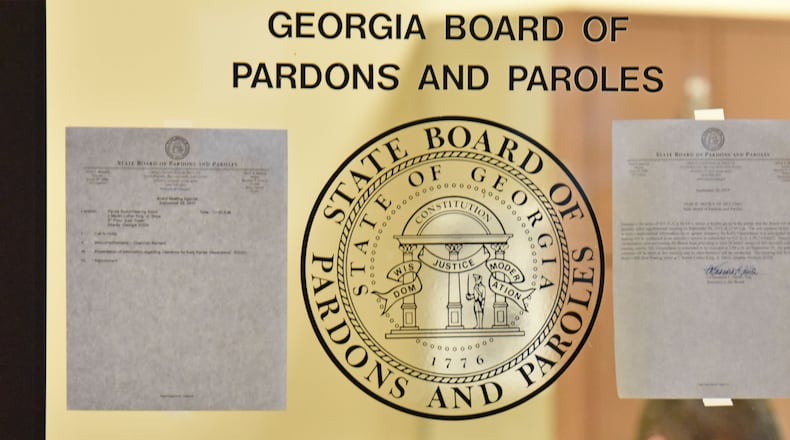Lawyers for a death row inmate who is slated to be executed Tuesday will ask the State Board of Pardons and Paroles to do something Monday that the courts have declined to do: look at juror bias.
Specifically, one juror allegedly lied about a history that most likely would have disqualified her from sitting on the panel that ultimately condemned William Sallie.
“We do not excuse or justify the damage that Mr. Sallie’s violent spree caused, fueled by the irrationality that we often see in the emotional turmoil of divorce and custody proceedings,” Sallie’s lawyers wrote in his clemency petition.
“The determination of a death sentence must occur only with the most pristine and careful proceedings uncorrupted by bias and dishonesty,” the petition said. “That simply did not happen here.”
Sallie, 50, is scheduled to be the ninth person executed in Georgia in 2016, more than any other state this year and more than in any other year in Georgia since the current death penalty law was adopted in 1973.
His lawyers will meet with the Parole Board on Monday morning, and in the afternoon the five-member board will hear from those who want Sallie's lethal injection carried out.
Sallie was convicted in Bacon County of murdering his father-in-law John Moore in 1990, shooting and wounding his mother-in-law Linda Moore, and kidnapping his estranged wife and her sister.
Sallie broke into his in-laws’ home — where his wife, Robin, and their 2-year-old son, Ryan, were sleeping — after he lost a custody battle and his wife filed for divorce.
Sallie's lawyers wrote in the clemency petition and in a series of court filings that the domestic turmoil in William and Robin Sallie's lives was much like that lived by a juror who denied ever being part of a volatile marriage, custody dispute or relationship that included domestic violence.
Twenty-four pages of the 31-page clemency petition are devoted to the young life of that juror and her four marriages. The Atlanta Journal-Constitution is not naming the juror because she could not be reached for comment.
When the woman was questioned during jury selection for the Sallie murder trial, she said her marriages had ended amicably with “no big court fights” and without a “big custody fight or issue.”
That’s false, Sallie’s lawyers argue in the clemency petition, which says the juror fought with soon-to-be ex-husbands over child custody and support payments and lived with domestic abuse.
The petition further says the judge who presided over Sallie’s trial also handled three of the juror’s four divorces that were marked by hostilities, allegations of lying to the court, and multiple court filings.
“The truth of the matter … is (the juror) had a checkered and tumultuous marriage, divorce and child custody history, including competing divorce and custody proceedings as in Mr. Sallie’s case. If only she had been honest during jury selection, she would … never have been on a jury that decided the fate of someone who she would see as merely the embodiment of her former husbands and the wrongs they had committed to her,” the clemency petition states. “But because she lied, no one knew.”
The juror told an investigator for Sallie’s lawyers that she pressured six other jury members who initially wanted to sentence Sallie to life until they agreed to a death sentence, making the jury’s decision unanimous.
“I pushed it,” the juror said, according to an affidavit attached to Sallie’s clemency petition. “I said that the laws can change and he could be set free and I won’t pay taxes to let him sit in jail. They tried to push that he found God in prison, but what person in prison hasn’t. I made a wise decision on this,” the juror said, according to the affidavit.
Sallie’s lawyers also questioned the juror’s judgment because she and a married male juror allegedly left the trial, after being sequestered, and went to her house. Several days after the trial ended, a deputy went to the female juror’s house to tell the male juror that his wife was looking for him.
None of those matters have been considered by an appellate court because, court filings and the petition said, Sallie’s lawyers missed a crucial deadline by a few days.
“Due to a technicality, a missed statute of limitations deadline at a time when Mr. Sallie was unrepresented by counsel and had no right to appointed counsel, no court has ever heard evidence regarding this juror(’s) misconduct and dishonesty,” the clemency petition said.
But prosecutors contend there is no legal basis for reopening Sallie’s case after deadlines have expired. The courts, so far, have agreed.
About the Author

